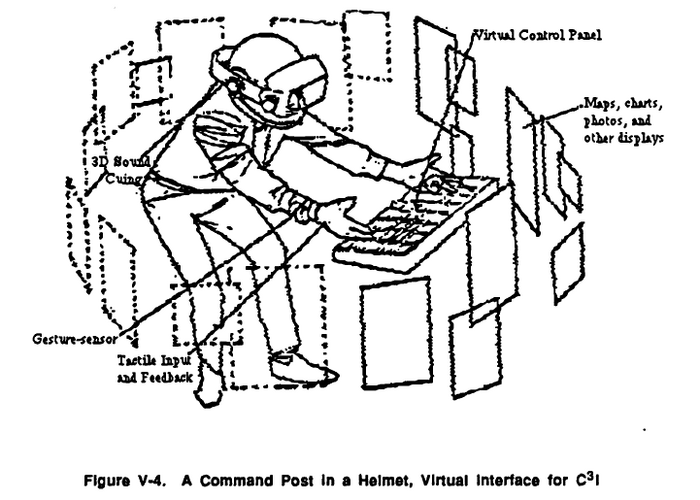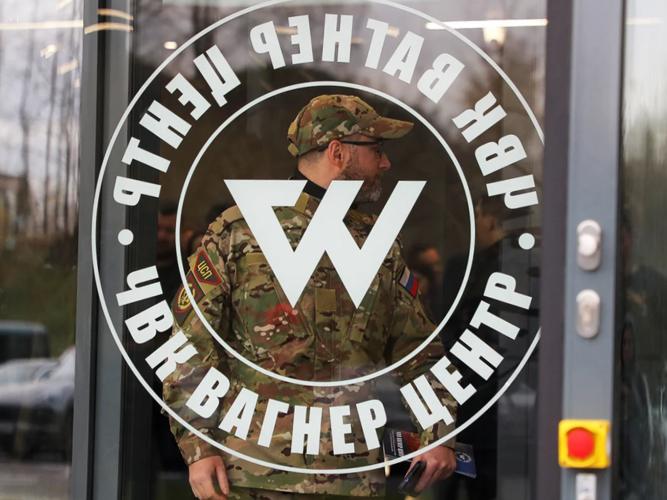One Cyberpunk Trope which featured prominently was that global megacorporations were more powerful than nation states and even fought one another.
Although Musk et al are major players they are not the EU or USA in military terms but there is sadly:

en.m.wikipedia.org
Yeah, but no. Wagner Group might have maintained their reputation as a fearsome corporate force if there weren't buckets of videos of their guys getting turned into hamburger by drones bought off of Wish.com and operated by Ukrainian weebs. The moment they went public with hiring prisoners, they turned into a joke.
The U.S. hired prisoners in 2008 to fight in Iraq. Given the painfully obvious similarities between the current Eastern European war and Iraq, this is a bit ironic, to say the least.
Wagner is far more powerful than any Western PMC, obviously. It's about as powerful as US SOCOM or the CIA in real terms I guess. Perhaps you are right that this makes them a laughingstock, as the CIA and SOCOM have consistently have their butts handed to them by Pahstun goat herders, Iranian farm kids, Iraqi alley beggars, and various West African, South Asian, and East African Muslims for the past 20 years. That partially explains how Wagner got so popular in the first place in Africa and the Middle East, after all, but on their home turf they enjoy quite a solid reputation for being "badass".
Perhaps it's as undeserved as the Green Berets'/Delta Force's or CIA's reputation, who only seem capable of taking down small time criminals like Pablo Escobar and al-Baghdadi, or ambushing old men in their bedrooms only decades after they lost relevance in their own organization like Bin Laden, but they seem to be quite mettled to be able to withstand things
that Americans actually shied away from at first blush. Maybe it's a Russian cultural virtue of being able to simply accept grim circumstance, not unlike the Japanese do, and the Americans don't. Which is weird, as America in WW2 was quite mettled, what with crashing B-25 bombers into Japanese destroyers and battling the IJN despite punishing air raids, and very rapidly went from being quite tough and tenacious to rather prissy and effete from the 1950's onwards. Maybe the Great Depression broke more than people's wallets?
Anyway it helps to understand that Wagner is essentially a combination of things that haven't existed in the "West" since the last time it was ascending as a collective civilization, the 1500s. It's part fraternity, part private/public business corporation, part biker gang, and part government agency, and there's no real direct analogy in Western spheres of government since the end of the High Middle Ages. Maybe Lloyd's in its original 1680's form. Something something they were also using the 234th Air Aslt Rgt radio callsigns in Syria, so it's clear Wagner is simultaneously more and less than meets the eye, but speaking in analogies is hard for something that has no analogy and speaking in truth is hard for something that is shadowy and nebulous.
If Blackwater were Wagner it would be US SOCOM (broad geopolitical coverage), the CIA SAD (sekrit), the 75th Ranger Regiment (big and muscular field unit), a military fraternity/regimental association, a potential career pathway for retired Special Forces footmen and generals, a public-traded corporation, a criminal enterprise, and a privately owned human resources concern, all at once. It's not contradictory though, but in the West it would be, because the West had started putting artificial and unnatural bureaucratic barriers against this sort of stuff in the 1800's and 1900's. Depending on where you live in Europe or America, these barriers came into place either after the US Civil War or after WW1, and then the regulators told everyone the barriers were always there once they started to bite down in the 1960's.
It's what America's DOD contractors who normally just cook food at a DFAC or refuse to deliver cargo would look like if the USG didn't give a hoot about petty corruption and insider trading, and instead encouraged such thinking in its government organs and bureaucrats. Something like if America brought back Jackson's Spoils System and obliterated the professional civil service, and proceeded to hand off all its government agencies' big shot seats to the Forbes Top 100, or something like that, and they all abide by a Omerta-esque code that ensures that if anyone squeaks they get shuffled out of sight and sent to jail for a very long time, which would encourage them to do well and not squeak. As I understand this is considered the ideal form of government by most Silicon Valley techno-fetishist libertarians, for some reason or another, but I cannot fathom what they see in it.
These barriers between government and business never materialized anywhere in Eastern Europe, except maybe Estonia and East Germany, which is why you get these weird medieval-esque neo-feudal economies in places with Hungary, Poland, Ukraine, and Russia as the most notable examples. Naturally these places, even when they have proper rule of law, are still weird as hell (for instance, it is very common [or rather, it isn't uncommon] in Eastern Europe, from the Urals to the Oder-Niesse, to believe that the native population suffered worse under communism than the Jews did under the Holocaust; I suppose only the Germans, Hungarians, and Romanians have retained the Ostalgie) too, which makes mapping connections onto Western cultural frameworks all the more difficult. Call it cultural baggage from the Tsars if you want, but Wagner is about as "corporate" as the 82nd Airborne is for occupying Iraqi golf courses so Halliburton can win construction contracts or KBR can win oil field operations contracts; or more prosaically as "corporate" as the CIA is for couping Guatemala's democratically elected president and installing a State Department patsy so the Dulles' brothers investments in United Fruit Company can get higher stocks for better dividends. Wagner has done both of these things, for the same reasons, at the behest of similarly connected and government-inclined client-operators.
Anyway Musk has found a way to be far more powerful generally involves simply not having private armies. Starlink essentially makes the entire Ukrainian Army one of Musk's armies without a cent touching anything as unproductive or low margin as a fighter jet or artillery rocket. I guess if he thinks the possibility of nuclear war is high he could just turn it off, or literally geofence the Starlink terminals along internal borders of February 23rd, and break their entire armed forces if they step beyond this. This is a far better form of control than having GI Joe wearing a Lockheed-Martin patch on his uniform because the Ukrainians won't be able to do anything and SpaceX can threaten the USAF's launches to pressure the Congress if push comes to shove.
It's doubtful that would actually happen given the recently stated war-ending goal of the United States is a return to the status quo ante, though. A defeat for Russia, but hardly a decisive one, and that is precisely the point as far as America is concerned. Hegemons enjoy stability, stability means limiting change, and destroying Russia versus making Ukraine malded, the US has already picked the malded option, but it isn't going to say the quiet part out loud unlike what the rather accomplished and generally tactful Mark Milley did. I suppose that's just exasperation at the State Department though.
In that sense, cyberpunk actually lowballed the strength of certain megacorps. They're almost as powerful as ethnic lobbyist groups and Congressional caucuses. Mere armies cannot replicate this strength, but other lobbyist groups and caucuses can band together to challenge it, and in that respect I don't think Musk or SpaceX are any more powerful than any other U.S. political organ. They're certainly a muscular player though and the amount of muscle garnered in the time spent is arguably the fastest growth of political power ever seen.
This power will wane over the coming decades as stuff like Starlink and vertical integration become more common and SpaceX's unique features become industry best practices.
Conversely, Wagner's political power (or something akin to it) will probably continue to grow as private contractors replace national armies due to a combination of lack of interest in states in pursuing the ever spiraling costs of foreign wars for limited gains and the aging of European and European-derivative populations' means fewer soldiers for said armies. These will mostly be composed of military veterans who still want to fight, the Ernst Junger/Storm of Steel types who are adventurous and enjoy fighting for fighting's sake, and generally will do things that special forces or commandos do in places like Somalia, Nigeria, or Philippines i.e. low level combat against insurrectionists or internal security threats.
National armies won't disappear of course, but wars between major world powers, or even major powers against third world powers, are increasingly less likely as the economic and political potentials of the global superpowers continues to decrease relative to the third world. They won't not happen, but we're not going to see strings of like half a dozen major ground wars every other year, as we saw in Desert Storm, Bosnia, Kosovo, Afghanistan, and Iraq that culminate in decades-long occupations. We might see one Iraq or one Desert Storm and then a hiatus for at least half a decade before a Kosovo or Bosnia happens, so instead of the UN Siege of Saddamism taking place over 10 years, it takes place over 20 years, or it never culminates because in that meantime the Saddamists attain nuclear weapons and become untouchable. The pace will also slow simply because the economic engines that allow these countries to wage war are gradually breaking down and crumbling, due to running into stiff headwinds of "sub-replacement fertility" and "increasing median age" for 60 years, and the effect that has on macroeconomic forecasts. It's not looking very good for anyone, except Nigeria and perhaps Israel, I guess.
Private armies of veteran soldiers in fraternal organizations makes a lot more sense in this context so Russia is just a window into the Western world's future in that regard. USA will resemble it a lot more in 2050 than it does now both politically and demographically (i.e. dominated by a single party, economically stagnant in tangible/real economic terms but perhaps still maintaining fiscal hegemony [for all a dollar will buy you at that point], and old), while Russia will probably resemble North Korea a lot more than it does now at that time economically but demographically it will still be shaped like itself (i.e. poor, single party system, but old), and China might resemble Germany or Japan/South Korea if the CPC plays their cards right or Italy, Turkey and Spain if they don't (i.e. world supplier of notable industrial components, or the foremost benders of basic metals on their continent yet nowhere else, and also old).
Cyberpunk's ultimate problem as a genre is it simply wasn't grim enough, really. It assumed everyone would still have the Internet, at least in so many decades in the future, when the reality is shaping up that electricity simply might not exist in a century. If it does, it will resemble a super-corporate Internet of Things retirement home more than the gritty live-fast-die-young mentality of cyberpunk. Alternatively it's an Amish Village, where electricity is far too precious to be wasted on something as trivial as entertainment, and thus only used for water pumps or refrigerators, if that. The live-fast mindset being simply too deeply rooted in the culturaly mentality of the early XX century, a time when people still had kids and median ages of the most economically powerful nations were still within childbearing years, to be believable as a future outcome.
Truly, macroeconomics is a bit dismal.
tl;dr Wagner is rather tougher than the Green Berets, since actual Green Berets seem to shy away from being bombed by Russian drones (and can't drive stick shift Ural trucks), while Wagner just throws bodies at Eastern European Verdun backed by the guns of Donetskites. Recruitment of prisoners is not much bearing on this, which itself is just common superpower reflexes when said superpower is getting clowned on by a third world state, as America was clowned on by Iran in Iraq and Pakistan in Afghanistan and suddenly found itself emptying prisons for tens of thousands of felony/moral waivers. Apparently the Four Policemen all think alike and thus all problems can be solved by throwing dudes at artillery shells.
Cyberpunk, especially the board game, was just describing the FSU's economic contractions mapped onto the USA, and pretty much entirely by accident. Not sure if that means Mike Pondsmith has an absolutely titanic brain, or is just a bog-standard Amero-pessismist that makes up about a third to half the US population, contingent entirely on current month's running average of gas and Jif peanut butter prices.











